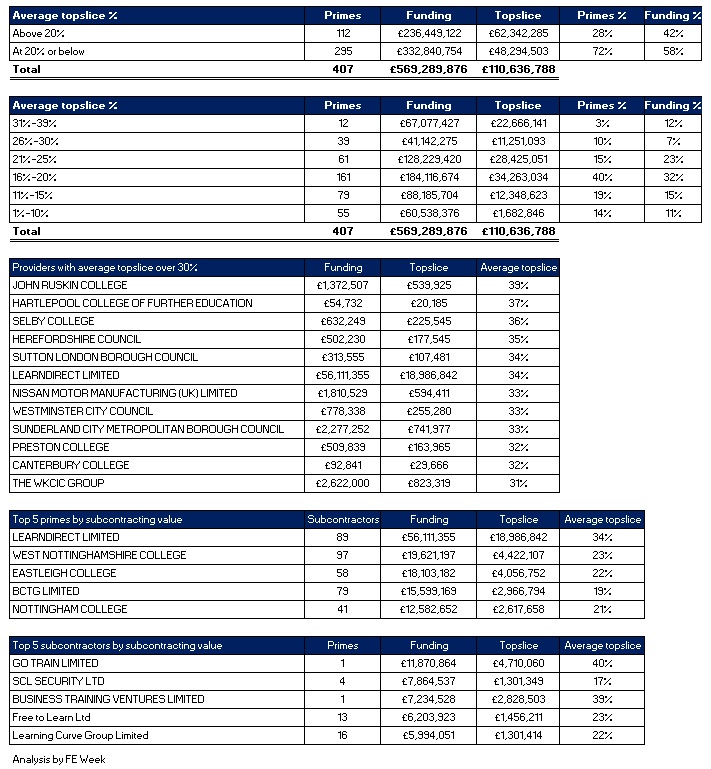Subcontracting top-slices exceeded £100 million last year, and 28 per cent of prime providers were charging more than 20 percent, FE Week can reveal.
The long-overdue subcontracting figures for 2016/17 have finally been published by the Education and Skills Funding Agency.
FE Week’s analysis of the data has shown that just under a third of primes were charging above the 20-per-cent best-practice threshold announced in March.
This threshold was agreed between the Association of Employment and Learning Providers, Holex and the Collab provider group. This represented 42 per cent of funding.
The Association of Employment and Learning Providers immediately criticised such “unacceptable fees”.
“There are some disgraceful & totally unacceptable fees here,” it tweeted. “@ESFAgov rules should now adopt @AELPUK @collabgrp @HOLEXPolicy 20% cap and hopefully this will feature in final report of current @CommonsEd inquiry”
A total of 407 prime providers charged an average top-slice of 19 per cent, of which 12 charged an average top-slice in excess of 30 per cent.
At 39 per cent, John Ruskin College had the highest average top-slice percentage (see tables below).

The biggest single deal was a £4.7 million (40 per cent) Learndirect top-slice taken from £11.9 million of adult education budget funding delivered by Go Train Limited.
“In reviewing its funding rules, the ESFA shouldn’t try to find a form of words to wheedle out of putting a 20-per-cent cap on management fees,” said AELP boss Mark Dawe. “
“There are some totally unacceptable and disgraceful figures among this data with millions of pounds being denied to frontline training as a result. The signals from the MPs on the select committee suggest that it is ready to take a tough stance when it reports on the apprenticeship reforms and the government must respond immediately.”
Top-slicing describes the level of funding that prime providers charge subcontractors in so-called “management fees”, in order to run training on their behalf.
Concern has mounted in recent years that certain lead providers were charging excessive rates, as an easy way of supplementing their incomes.
The ESFA revealed in April that subcontracting fees and charges are to be reviewed to ensure government funding is being used for “recognised costs”.
“In the coming months, we will be reviewing aspects of the subcontracting funding rules,” it said.
This will include “subcontracting fees and charges, so that we can be assured that our funding is being used for recognised costs”.
Any subsequent changes to subcontracting rules will come into force from August.
Ofsted has also taken a closer interest in subcontracting; it announced in February that it would be conducting two new types of monitoring visit.
The first are monitoring visits to a sample of new apprenticeship providers. The second are monitoring visits to directly funded providers to look specifically at subcontracted provision.
Individual lead providers used to have to publish their annual figures on their websites by the end of November every year.
This changed from 2016/17, when new rules dictated that providers had to inform the ESFA of their figures, which should then be published centrally.
But the agency came in for heavy criticism as November passed without any indication of when the full figures would be revealed for last academic year.
The sector finally got its answer in April, after Gordon Marsden, the shadow skills minister asked, through a written parliamentary question lodged, when the government planned to publish the fees.
The education minister Nadhim Zahawi replied this would be by the end of June – and they were finally published at 4.55pm on June 29.
The ESFA has been approached for comment.
